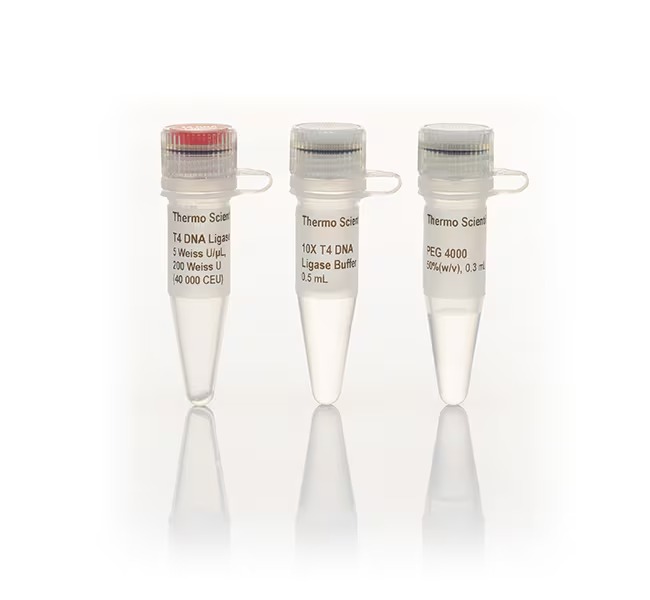Specifications:
| Application | Gel Electrophoresis, Cloning | ||
| Storage Temperature | -20°C | ||
| Product Type | Enzymes | Forms | Liquid |
| Product Brand | Thermo Fisher Scientific™ | ||
| Product Grade | Molecular Biology | ||
Thermo Scientific™ T4 DNA Ligase is a high-performance enzyme that catalyzes the formation of a phosphodiester bond between adjacent 5'-phosphate and 3'-hydroxyl termini in DNA or RNA. The enzyme plays a crucial role in repairing single-strand nicks in duplex DNA, RNA, or DNA/RNA hybrids, and is widely used in molecular biology applications, particularly in cloning, site-directed mutagenesis, and ligation of DNA fragments.
T4 DNA Ligase is particularly effective for joining DNA fragments with either cohesive or blunt ends, making it an essential tool in a variety of research applications. The enzyme does not act on single-stranded nucleic acids, ensuring specificity for duplex DNA or RNA.
T4 DNA Ligase requires ATP as a cofactor for its enzymatic activity and is optimized for use in common buffers such as Thermo Scientific restriction enzyme, PCR, and RT buffers (when supplemented with ATP).
Key Features:
- Rapid Action: Sticky-end ligation can be completed in as little as 10 minutes at room temperature, ensuring efficiency in experimental setups.
- Efficient Blunt-End Ligation: Supplied with PEG solution, which enhances blunt-end ligation, making it easier to join blunt-ended DNA fragments.
- Versatility: Active in various buffers, including Thermo Scientific restriction enzyme, PCR, and RT buffers, making it adaptable for a wide range of molecular biology applications.
Applications:
-
Cloning of Restriction Enzyme Generated DNA Fragments:
- Used for ligating DNA fragments produced by restriction enzymes, essential for cloning applications.
-
Cloning of PCR Products:
- Enables the ligation of PCR-generated DNA fragments into vectors for cloning or expression studies.
-
Joining of Double-Stranded Oligonucleotide Linkers or Adaptors:
- Ideal for attaching oligonucleotide linkers or adaptors to DNA molecules in various genetic manipulation protocols.
-
Site-Directed Mutagenesis:
- Essential for mutagenesis experiments, enabling the introduction of specific mutations into DNA sequences.
-
Amplified Fragment Length Polymorphism (AFLP):
- Used in AFLP analysis, which is a powerful tool for identifying genetic markers.
-
Ligase-Mediated RNA Detection:
- Employed in RNA detection methods to join RNA fragments or detect specific RNA sequences in gene expression studies.
-
Nick Repair in Duplex DNA, RNA, or DNA/RNA Hybrids:
- T4 DNA Ligase repairs single-strand nicks in duplex DNA and RNA, or DNA/RNA hybrids, to maintain the integrity of nucleic acids.
-
Self-Circularization of Linear DNA:
- Can facilitate the self-circularization of linear DNA, a critical step in certain types of DNA cloning.
Contents:
- T4 DNA Ligase
- 10X T4 DNA Ligase Buffer
- 50% PEG Solution (for efficient blunt-end ligation)
Important Notes:
- When preparing for agarose gel electrophoresis, it is recommended to incubate samples with 6X DNA Loading Dye & SDS Solution at 70°C for 5 minutes or 65°C for 10 minutes, then chill on ice to prevent band shifting caused by T4 DNA Ligase binding to DNA.
- In transformation protocols, the volume of the ligation reaction should not exceed 10% of the competent cell volume.
- Precipitation of the ligation mixture is recommended before electro-transformation to remove T4 DNA Ligase using spin columns or chloroform extraction.
Specifications:
| Feature | Details |
|---|---|
| Enzyme Type | DNA Ligase |
| Concentration | 5 U/μL |
| Buffer | 10X T4 DNA Ligase Buffer |
| Packaging | 200 units, 1,000 units, 5 x 1,000 units |
| Storage Temperature | Ambient (store at room temperature) |
| Unit Size | Each (specific packaging varies) |
| Applications | Cloning, PCR product ligation, mutagenesis, AFLP, RNA detection, DNA repair |
Storage:
- Store at ambient temperature for regular use. Ensure proper handling to maintain enzyme activity and shelf life.
The Thermo Scientific™ T4 DNA Ligase (5 U/μL) is an essential enzyme for a variety of applications in molecular biology, from cloning and site-directed mutagenesis to DNA repair and ligase-mediated RNA detection. Its versatility, fast action, and ability to handle both sticky and blunt-ended DNA fragments make it a crucial reagent for researchers conducting genetic manipulation and other nucleic acid-based experiments.
- Pack Size: 200 UNITS 1,000 units 5 x 1,000 Units




 0
0


